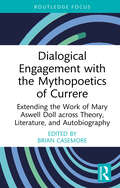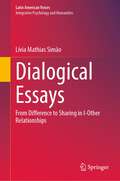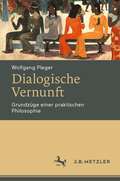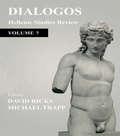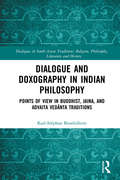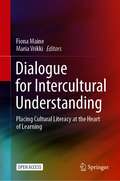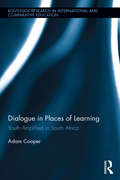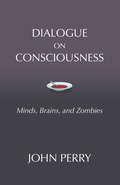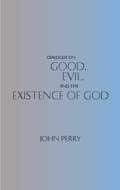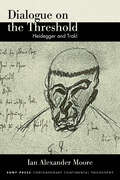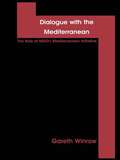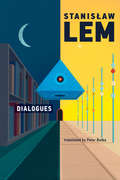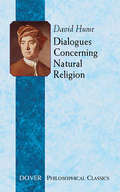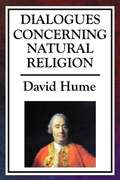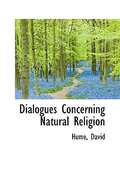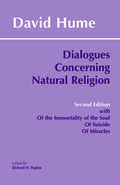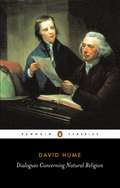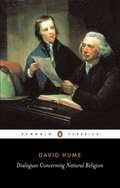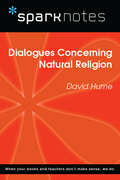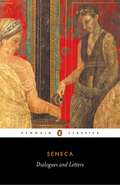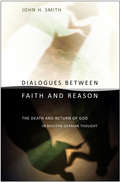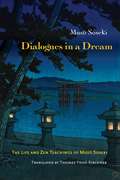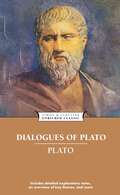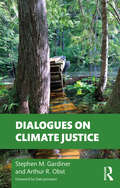- Table View
- List View
Dialogical Engagement with the Mythopoetics of Currere: Extending the Work of Mary Aswell Doll across Theory, Literature, and Autobiography (Studies in Curriculum Theory Series)
by Brian CasemoreThis volume showcases a series of chapters that elaborate on Mary Aswell Doll’s contributions to the field of curriculum theory through her examination of currere as a mythopoetics. By bringing Doll’s Jungian, autobiographical, and literary perspectives into conversation with emergent forms of subjective inquiry—including aesthetic concepts, ecological questions, and spiritual themes—the volume foregrounds the originality and significance of Doll’s book The Mythopoetics of Currere in particular, while simultaneously extending it and demonstrating its applications in various scholarly conversations. Leading scholars in the field of curriculum studies such as William F. Pinar and Molly Quinn demonstrate how they use Doll’s ideas as pedagogy, as theoretical framing for their work, and as the basis of their own study and self-exploration. A response essay from Doll herself concludes the text, bringing further thought and insight to the mythopoetic dimensions of currere. This text will benefit scholars, academics, and students in the fields of curriculum studies, curriculum theory, and the foundations of education more broadly. Teachers and teacher educators interested in the conceptualization of curriculum in humanities education will also benefit from this volume.
Dialogical Essays: From Difference to Sharing in I-Other Relationships (Latin American Voices)
by Lívia Mathias SimãoThis book presents a collection of interrelated essays that analyze the theoretical foundations of semiotic-cultural constructivism in psychology written by one of the pioneers in this field of research: Dr. Lívia Mathias Simão, senior professor at the Institute of Psychology of the University of São Paulo, Brazil. In each of the five essays included in this book, the author establishes a dialogue with key thinkers and intellectual traditions of dialogical approaches arriving at core points of I-other relationships according to the perspective of semiotic-cultural constructivism in psychology.The first essay establishes a dialogue with Greek philosophers such as Parmenides and Aristotle. In the second essay this dialogue is established with semiotic-constructivist psychologists such as Jaan Valsiner, Ragnar Rommetveit and Ivana Marková. The third essay is a dialogue with the contributions of Ernst Boesch’s symbolic action theory. The fourth essay proposes a dialogue between semiotic-cultural constructivists and Hans-Georg Gadamer’s hermeneutics. Finally, the fifth essay proposes how the philosophy of Emmanuel Levinas contributes to dialogical studies of I-other in the context of semiotic-cultural constructivism.Originally published in Portuguese for the Brazilian market, Dialogical Essays: From Difference to Sharing in I-Other Relationships is now published in English in an international edition that will be of interest to psychologists, philosophers, historians and other human and social scientists interested in epistemological, ontological and ethical aspects of I-other relationships from the perspective of semiotic-cultural constructivism and cultural psychology.
Dialogische Vernunft: Grundzüge einer praktischen Philosophie
by Wolfgang PlegerDer Mensch ist als Person für sein Handeln verantwortlich. Er antwortet in einem Spielraum der Freiheit auf die vielfältigen Herausforderungen von praktischen Situationen im sozialen Leben und in seiner natürlichen Mitwelt. Der Maßstab der Verantwortung ist die Vernunft. Der Dialog eröffnet die Chance, ihren konkreten Anspruch zu ermitteln und zu prüfen. Das Buch bietet eine historisch-systematische und interdisziplinär angelegte Einführung in grundlegende Themen der praktischen Philosophie, wie Ethik und Menschenrechte, Geschichte und Gesellschaft, Politik und Pädagogik sowie Kultur und Technik. Jeder Bereich wird durch drei bis vier Positionen vorgestellt und durch zentrale Zitate anschaulich erläutert. Vertreten sind neben philosophischen Konzepten solche aus den Natur-, Sozial- und Kulturwissenschaften. Der geschichtliche Bogen spannt sich von Solon, der den Gedanken des Rechtsstaates entwickelte, bis hin zu Corine Pelluchon, die sich im Zeitalter der ökologischen Krise mit der Frage der zukünftigen Bewohnbarkeit der Erde auseinandersetzt. Es schließt mit einem Plädoyer für dialogische Vernunft.
Dialogos: Hellenic Studies Review
by Michael Trapp David RicksDialogos" encompasses Greek language and literature, Greek history and archaeology, Greek culture and thought, present and past: a territory of distinctive richness and unsurpassed influence. It seeks to foster critical awareness and informed debate about the ideas, events and achievements that make up this territory, by redefining their qualities, by exploring their interconnections and by reinterpreting their significance within Western culture and beyond.
Dialogue and Doxography in Indian Philosophy: Points of View in Buddhist, Jaina, and Advaita Vedānta Traditions (Dialogues in South Asian Traditions: Religion, Philosophy, Literature and History)
by Karl-Stéphan BouthilletteThis is the first book fully dedicated to Indian philosophical doxography. It examines the function such dialectical texts were intended to serve in the intellectual and religious life of their public. It looks at Indian doxography both as a witness of inter- and intra-sectarian dialogues and as a religious phenomenon. It argues that doxographies represent dialectical exercises, indicative of a peculiar religious attitude to plurality, and locate these ‘exercises’ within a known form of ‘yoga’ dedicated to the cultivation of ‘knowledge’ or ‘gnosis’ (jñāna). Concretely, the book presents a critical examination of three Sanskrit doxographies: the Madhyamakahṛdayakārikā of the Buddhist Bhāviveka, the Ṣaḍdarśanasamuccaya of the Jain Haribhadra, and the Sarvasiddhāntasaṅgraha attributed to the Advaitin Śaṅkara, focusing on each of their respective presentation of the Mīmāṃsā view. It is the first time that the genre of doxography is considered beyond its literary format to ponder its performative dimension, as a spiritual exercise. Theoretically broad, the book reaches out to academics in religious studies, Indian philosophy, Indology, and classical studies.
Dialogue for Intercultural Understanding: Placing Cultural Literacy at the Heart of Learning
by Fiona Maine Maria VrikkiThis open access book is a result of an extensive, ambitious and wide-ranging pan-European project focusing on the development of children and young people’s cultural literacy and what it means to be European in the 21st century prioritising intercultural dialogue and mutual understanding. The Horizon 2020 funded, 3-year DIalogue and Argumentation for cultural Literacy Learning (DIALLS) project included ten partners from countries in and around Europe with the aim to centralise co-constructive dialogue as a main cultural literacy value and to promote tolerance, empathy and inclusion. This is achieved through teaching children in schools from a young age to engage together in discussions where they may have differing viewpoints or perspectives, to enable a growing awareness of their own cultural identities, and those of others. Central to the project is children’s engagement with wordless picture books and films, which are used as stimuli for discussions around core cultural themes such as social responsibility, living together and sustainable development. In order to enable intercultural dialogue in action, the project developed an online platform as a tool for engagement across classes, and which this book elaborates on.The book explores themes underpinning this unique interdisciplinary project, drawing together scholars from cultural studies, civics education and linguistics, psychologists, socio-cultural literacy researchers, teacher educators and digital learning experts. Each chapter of the book explores a theme that is common to the project, and celebrates its interdisciplinarity by exploring these themes through different lenses.
Dialogue in Places of Learning: Youth Amplified in South Africa (Routledge Research in International and Comparative Education)
by Adam CooperShowing how youth from one of the poorest and most violent neighborhoods in Cape Town, South Africa, learn differently in three educational contexts— in classrooms, in a community hip hop crew, on a youth radio show—this book illuminates how South African schools, like schools elsewhere, subtly reproduce inequalities by sorting students into social hierarchies linked to assessments of their use of language. Highlighting the voices and perspectives of young South Africans, this case study of youth in the global South explores how language is linked to cultural mixing which occurred during colonialism and slavery and continues through patterns of global mobility. Dialogue in Places of Learning: Youth Amplified in South Africa demonstrates how language and learning are bound to space and place.
Dialogue on Consciousness: Minds, Brains, and Zombies (Hackett Philosophical Dialogues)
by John PerryJohn Perry revisits the cast of characters of his classic A Dialogue on Personal Identity and Immortality in this absorbing dialogue on consciousness. Cartesian dualism, property dualism, materialism, the problem of other minds . . . Gretchen Weirob and her friends tackle these topics and more in a dialogue that exemplifies the subtleties and intricacies of philosophical reflection. Once again, Perry’s ability to use straightforward language to discuss complex issues combines with his mastery of the dialogue form. A Bibliography lists relevant further readings keyed to topics discussed in the dialogue. A helpful Glossary provides a handy reference to terms used in the dialogue and an array of clarifying examples.
Dialogue on Good, Evil, and the Existence of God
by John PerryJohn Perry--author of the acclaimed Dialogue on Personal Identity and Immortality (Hackett Publishing Co., 1978)--revisits Gretchen Weirob in this lively and absorbing dialogue on good, evil, and the existence of God. In the early part of the work, Gretchen and her friends consider whether evil provides a problem for those who believe in the perfection of God. As the discussion continues they consider the nature of human evil—whether, for example, fully rational actions can be intentionally evil. Recurring themes are the distinction between natural evil and evil done by free agents, and the problems the Holocaust and other cases of genocide pose for conceptions of the universe as a basically good place, or humans as basically good beings. Once again, Perry’s ability to get at the heart of matters combines with his exemplary skill at writing the dialogue form. An ideal volume for introducing students to the subtleties and intricacies of philosophical discussion.
Dialogue on the Threshold: Heidegger and Trakl (SUNY series in Contemporary Continental Philosophy)
by Ian Alexander MooreIn the early 1950s, German philosopher Martin Heidegger proclaimed the Austrian expressionist Georg Trakl to be the poet of his generation and of the hidden Occident. Trakl, a guilt-ridden lyricist who died of a cocaine overdose in the early days of World War I, thus became for Heidegger a redemptive successor to Hölderlin. Drawing on Derrida's Geschlecht series and substantial archival research, Dialogue on the Threshold explores the productive and problematic tensions that pervade Heidegger's reading of Trakl and reflects more broadly on the thresholds that separate philosophy from poetry, gathering from dispersion, the same from the other, and the native from the foreigner. Ian Alexander Moore examines why Heidegger was reluctant to follow Trakl's invitation to cross these thresholds, even though his encounter with the poet did compel him to take up, in astounding ways, many underrepresented topics in his philosophical corpus such as sexual difference, pain, animality, and Christianity. A contribution not just to Heidegger and Trakl studies but also, more modestly, to the old quarrel between philosophy and poetry, Dialogue on the Threshold concludes with new translations of eighteen poems by Trakl.
Dialogue with the Mediterranean: The Role of NATO's Mediterranean Initiative (Contemporary Issues in European Politics #Vol. 7)
by Gareth Mark WinrowThe first examination of the importance of NATO's Mediterranean Initiative for the security and stability of the Euro-Mediterranean area, this book discusses the challenges, risks, and possible threats to NATO member states which may stem from the southern and eastern Mediterranean.
Dialogues
by Stanislaw LemThe first English translation of a nonfiction work by Stanisław Lem, which was "conceived under the spell of cybernetics" in 1957 and updated in 1971.In 1957, Stanisław Lem published Dialogues, a book "conceived under the spell of cybernetics," as he wrote in the preface to the second edition. Mimicking the form of Berkeley's Three Dialogues between Hylas and Philonous, Lem's original dialogue was an attempt to unravel the then-novel field of cybernetics. It was a testimony, Lem wrote later, to "the almost limitless cognitive optimism" he felt upon his discovery of cybernetics. This is the first English translation of Lem's Dialogues, including the text of the first edition and the later essays added to the second edition in 1971. For the second edition, Lem chose not to revise the original. Recognizing the naivete of his hopes for cybernetics, he constructed a supplement to the first dialogue, which consists of two critical essays, the first a summary of the evolution of cybernetics, the second a contribution to the cybernetic theory of the "sociopathology of governing," amending the first edition's discussion of the pathology of social regulation; and two previously published articles on related topics. From the vantage point of 1971, Lem observes that original book, begun as a search for methods "that would increase our understanding of both the human and nonhuman worlds," was in the end "an expression of the cognitive curiosity and anxiety of modern thought."
Dialogues Concerning Natural Religion
by David HumeHow can we know that God exists? Is it possible to find proof of religion's most significant issues? Can we presume that the orderliness of the universe offers evidence of a purposeful creator? David Hume's Dialogues Concerning Natural Religion explores these perennial questions in a thought-provoking and highly readable style.This classic examines its controversial subject in the well-known manner of the Platonic dialogues. Hume's characters discuss God's existence, his divinity and attributes, and the reasons behind his creation of the world. In clear, evocative prose, the debate's participants state and defend their positions, most of which center on the concept currently known as Intelligent Design. Hume's intense skepticism provides ingenious, persuasive refutations of the notion that reason and logic provide support for religious dogma. A work of historical importance as well as of ongoing relevance to modern life, this volume endures as both an inspiring philosophical inquiry and a literary gem.
Dialogues Concerning Natural Religion
by David HumeDialogues Concerning Natural Religion is an important philosophical work written by the Scottish philosopher David Hume. Through dialogue three fictional characters named Demea, Philo, and Cleanthes debate the nature of God's existence. While all three agree that a god exists, they differ sharply in opinion as to God's nature. They also differ as to whether or not humankind can come to knowledge of a deity.
Dialogues Concerning Natural Religion
by David HumeDialogues Concerning Natural Religion is a philosophical work by the Scottish philosopher David Hume. Through dialogue, three philosophers named Demea, Philo, and Cleanthes debate the nature of God's existence.
Dialogues Concerning Natural Religion
by David Hume Richard H. PopkinHume's brilliant and dispassionate essay Of Miracles has been added in this expanded edition of his Dialogues Concerning Natural Religion, which also includes Of the Immortality of the Soul,Of Suicide, and Richard Popkin's illuminating Introduction.
Dialogues Concerning Natural Religion
by David HumeIn the posthumously published Dialogues Concerning Natural Religion, the Enlightenment philosopher David Hume attacked many of the traditional arguments for the existence of God, expressing the belief that religion is founded on ignorance and irrational fears. Though calm and courteous in tone - at times even tactfully ambiguous - the conversations between Hume's vividly realized fictional figures form perhaps the most searching case ever mounted against orthodox Christian theological thinking and the 'deism' of the time, which pointed to the wonders of creation as conclusive evidence of God's Design. Hume's characters debate these issues with extraordinary passion, lucidity and humour, in one of the most compelling philosophical works ever written.
Dialogues Concerning Natural Religion
by David Hume Introduction Martin Bell EditorIn the posthumously published Dialogues Concerning Natural Religion, the Enlightenment philosopher David Hume attacked many of the traditional arguments for the existence of God, expressing the belief that religion is founded on ignorance and irrational fears. Though calm and courteous in tone - at times even tactfully ambiguous - the conversations between Hume's vividly realized fictional figures form perhaps the most searching case ever mounted against orthodox Christian theological thinking and the 'deism' of the time, which pointed to the wonders of creation as conclusive evidence of God's Design. Hume's characters debate these issues with extraordinary passion, lucidity and humour, in one of the most compelling philosophical works ever written. <p><p> For more than seventy years, Penguin has been the leading publisher of classic literature in the English-speaking world. With more than 1,700 titles, Penguin Classics represents a global bookshelf of the best works throughout history and across genres and disciplines. Readers trust the series to provide authoritative texts enhanced by introductions and notes by distinguished scholars and contemporary authors, as well as up-to-date translations by award-winning translators.
Dialogues Concerning Natural Religion (SparkNotes Philosophy Guide)
by SparkNotesDialogues Concerning Natural Religion (SparkNotes Philosophy Guide) Making the reading experience fun! SparkNotes Philosophy Guides are one-stop guides to the great works of philosophy–masterpieces that stand at the foundations of Western thought. Inside each Philosophy Guide you&’ll find insightful overviews of great philosophical works of the Western world.
Dialogues and Letters
by SenecaA major writer and a leading figure in the public life of Rome, Seneca (c. 4BC-AD 65) ranks among the most eloquent and influential masters of Latin prose. This selection explores his thoughts on philosophy and the trials of life. In the Consolation to Helvia he strives to offer solace to his mother, following his exile in AD 41, while On the Shortness of Life and On Tranquillity of Mind are lucid and compelling explorations of Stoic thought. Witty and self-critical, the Letters - written to his young friend Lucilius - explore Seneca's struggle to acquire philosophical wisdom. A fascinating insight into one of the greatest minds of Ancient Rome, these works inspired writers and thinkers including Montaigne, Rousseau, and Bacon, and continue to intrigue and enlighten.
Dialogues between Faith and Reason: The Death and Return of God in Modern German Thought
by John H. SmithThe contemporary theologian Hans Küng has asked if the "death of God," proclaimed by Nietzsche as the event of modernity, was inevitable. Did the empowering of new forms of rationality in Western culture beginning around 1500 lead necessarily to the reduction or privatization of faith? In Dialogues between Faith and Reason, John H. Smith traces a major line in the history of theology and the philosophy of religion down the "slippery slope" of secularization—from Luther and Erasmus, through Idealism, to Nietzsche, Heidegger, and contemporary theory such as that of Derrida, Habermas, Vattimo, and Asad. At the same time, Smith points to the persistence of a tradition that grew out of the Reformation and continues in the mostly Protestant philosophical reflection on whether and how faith can be justified by reason. In this accessible and vigorously argued book, Smith posits that faith and reason have long been locked in mutual engagement in which they productively challenge each other as partners in an ongoing "dialogue."Smith is struck by the fact that although in the secularized West the death of God is said to be fundamental to the modern condition, our current post-modernity is often characterized as a "postsecular" time. For Smith, this means not only that we are experiencing a broad-based "return of religion" but also, and more important for his argument, that we are now able to recognize the role of religion within the history of modernity. Emphasizing that, thanks to the logos located "in the beginning," the death of God is part of the inner logic of the Christian tradition, he argues that this same strand of reasoning also ensures that God will always "return" (often in new forms). In Smith's view, rational reflection on God has both undermined and justified faith, while faith has rejected and relied on rational argument. Neither a defense of atheism nor a call to belief, his book explores the long history of their interaction in modern religious and philosophical thought.
Dialogues in a Dream
by Thomas Kirchner Muso SosekiDrawing on his encyclopaedic knowledge, one of the most famous masters in the history of Zen leads us on a grand tour of Buddhist theology in all its timeless relevance.Muso Soseki, the renowned fourteenth century Zen master, is today most known for developing the art of traditional Japanese Zen gardening. Even more impressive is his creation of the institutional structure for all Japanese Buddhist temples, which still in use today. Dialogues in a Dream is one of the many projects Soseki took on in this final period of his life. Written in the guise of a conversation between Soseki and the shogun, the work covers the breadth of Buddhist philosophy and practice, and includes insightful discussions of prayer, mediation, and the place of study in religious life. His penetrating analysis deepens our appreciation of even the simplest Buddhist practices. Acclaimed scholar Thomas Yuho Kirchner painstakingly translates this classic text into English.
Dialogues of Love
by Damian Bacich Leone Ebreo Rosella PescatoriFirst published in Rome in 1535,Leone Ebreo's Dialogues of Love is one of the most important texts of the European Renaissance. Well known in the Italian academies of the sixteenth century, its popularity quickly spread throughout Europe, with numerous reprintings and translations into French, Latin Spanish, and Hebrew. It attracted a diverse audience that included noblemen, courtesans, artists, poets, intellectuals, and philosophers. More than just a bestseller, the work exerted a deep influence over the centuries on figures as diverse as Giordano Bruno, John Donne, Miguelde Cervantes, and Baruch Spinoza.Leone's Dialogues consists of three conversations - 'On Love and Desire,' 'On the Universality of Love,' and 'Onthe Origin of Love' - that take place over a period of three subsequent days.They are organized in a dialogic format, much like a theatrical representation, of a conversation between a man, Philo, who plays the role of the lover andteacher, and a woman, Sophia, the beloved and pupil. The discussion covers a wide range of topics that have as their common denominator the idea of Love. Through the dialogue, the author explores many different points of view and complex philosophical ideas. Grounded in a distinctly Jewish tradition, and drawing on Neoplatonic philosophical structures and Arabic sources, the work offers a useful compendium of classical and contemporary thought, yet was not incompatible with Christian doctrine. Despite the unfinished state and somewhat controversial, enigmatic nature of Ebreo's famous text, it remains one of the most significant and influential works in the history of Western thought. This new, expertly translated and annotated English edition takes into account the latest scholarship and provides aninvaluable resource for today's readers.
Dialogues of Plato: Containing The Apology Of Socrates, Crito, Phaedo, And Protagoras (classic Reprint) (Enriched Classics)
by PlatoENDURING LITERATURE ILLUMINATED BY PRACTICAL SCHOLARSHIP In these influential dialogues--Euthyphro, Apology, Crito, Meno, Phaedo, Symposium--Plato employs the dialectic method to examine the trial and death of his mentor, Socrates, and address the eternal questions of human existence. THIS ENRICHED CLASSIC EDITION INCLUDES: * A concise introduction that gives the reader important background information * A chronology of the author's life and work * A timeline of significant events that provides the book's historical context * An outline of key themes and plot points to guide the reader's own interpretations * Detailed explanatory notes * Critical analysis and modern perspectives on the work * Discussion questions to promote lively classroom and book group interaction * A list of recommended related books and films to broaden the reader's experience Simon & Schuster Enriched Classics offer readers affordable editions of great works of literature enhanced by helpful notes and insightful commentary. The scholarship provided in Enriched Classics enables readers to appreciate, understand, and enjoy the world's finest books to their full potential.
Dialogues on Climate Justice (Philosophical Dialogues on Contemporary Problems)
by Stephen M. Gardiner Arthur ObstWritten both for general readers and college students, Dialogues on Climate Justice provides an engaging philosophical introduction to climate justice, and should be of interest to anyone wanting to think seriously about the climate crisis. The story follows the life and conversations of Hope, a fictional protagonist whose life is shaped by a terrifyingly real problem: climate change. From the election of Donald Trump in 2016 until the 2060s, the book documents Hope’s discussions with a diverse cast of characters. As she ages, her conversations move from establishing the nature of the problem, to engaging with climate skepticism, to exploring her own climate responsibilities, through managing contentious international negotiations, to considering big technological fixes, and finally, as an older woman, to reflecting with her granddaughter on what one generation owes another. Following a philosophical tradition established by Plato more than two thousand years ago, these dialogues are not only philosophically substantive and carefully argued, but also distinctly human. The differing perspectives on display mirror those involved in real-world climate dialogues going on today. Key Features: Written in an engaging dialogue form, which includes characterization, clear exchanges of ideas, and a compelling story arc Clearly organized to allow readers both in-depth consideration and rapid overviews of various topics Memorable examples that enable and encourage discussion inside and outside the classroom An Introduction to the book aimed at instructors, which includes helpful instructions for teaching the book and engaging student assignments
